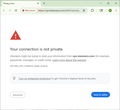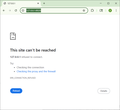
Since updating to Firefox Developer 143.0b4 FortiClient VPN no longer works
In order to get the FortiClient VPN to connect I have to set my default browser to Chrome, but then unfortunately my default browser is Chrome.
Chosen solution
Apparently the connection URL was wrong. When I changed it to a secoinc.net URL everything is fine.
Not sure why Chrome seems okay with it but that is not your problem. :D Thank you!
Read this answer in context 👍 0All Replies (11)
Hmm, is there a list of the changes between beta 3 and beta 4?
You could file a new bug: https://bugzilla.mozilla.org/
If you want to dive deeper, you could look at whether Mozregression could work for this situation: https://mozilla.github.io/mozregression/
And if it's relevant in your environment, you could download the FortiClient app, which I don't think cares what your default browser is: https://www.fortinet.com/support/product-downloads
As of this morning Chrome is giving me the attached. I presume this is also the problem with Firefox which does not give me an option to "continue to..."
Is there a way I can get Firefox to let me continue to the site in spite of the certificate?
In your Chrome screenshot, the problem clearly is an invalid site certificate, so there is a specific action you can take to get to the next level. What does Chrome give you with the address shown in your Firefox screenshot? Firefox's message sounds like a time-out, which is not a scenario where you can make an exception.
You could try a manual exception: on Firefox's Settings page, slowly type cert into the tiny search box to filter to the relevant section. Then click the View Certificates... button to launch the certificate manager. Switch to the Servers list and click Add Exception. Then try entering one for 127.0.0.1:8020 and see whether Firefox can retrieve the certificate. (If you already have an old exception for that server:port, delete it before trying to add a new one.)
Chrome is no longer giving me that page but just connects to the VPN. As best I recall, I just clicked the "Advanced" button and followed the "unsafe" link to continue to the site.
In Firefox when I attempt to add a security exception and get the certificate for 127.0.0.1:8020 I get:
No Information Available Unable to obtain identification status for this site.
after which I am unable to confirm the security exception.
Just to confirm, if you open https://127.0.0.1:8020/ in Chrome, does it load a page, or redirect to a different address, or something else?
When I try to open that in Chrome directly I get the attached. It functions when it goes there as invoked by the FortiClient connect to VPN, which I guess starts up a localhost (127.0.0.1) server to handle it, killing the server once it succeeds or fails.
Could you try the steps described in the following thread: https://community.fortinet.com/t5/Support-Forum/FortiClient-7-4-1-to-7-4-3-Update-broke-SAML-via-FireFox-Dev/m-p/409376/highlight/true#messageview_8
In case that isn't accessible:
Open the Settings page using either:
- "3-bar" menu button (or Tools menu) > Settings (previously "Options")
- type or paste about:preferences into the address bar and press Enter to load it
In the very tiny search box at the top of the page, type proxy and Firefox should filter to the "Network Settings" section.
Click the Settings button, select "No Proxy" near the top of the dialog, and click OK near the bottom of the dialog.
Any difference?
After updating to 143.0b8 this morning I can connect to the VPN using Firefox again!
I appreciate all of the help and hope I will not need to revisit this.
This morning I am back to having an apparently insurmountable error. Chrome continues to be able to surmount it, however.
Chosen Solution
Apparently the connection URL was wrong. When I changed it to a secoinc.net URL everything is fine.
Not sure why Chrome seems okay with it but that is not your problem. :D Thank you!
It's possible Chrome will allow an insecure redirect in some cases where Firefox won't. But if you do not need to redirect in the first place, that would be ideal.




